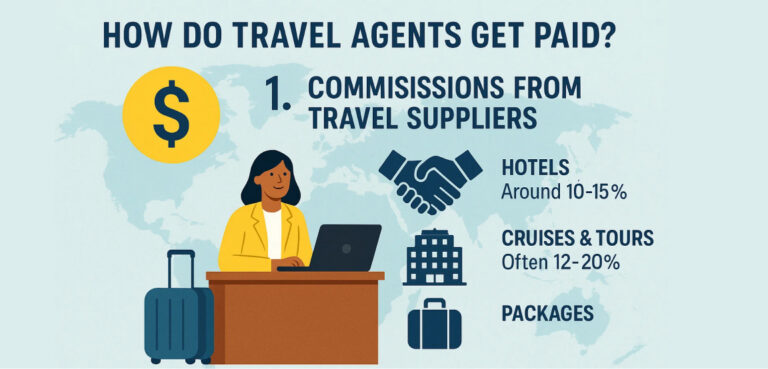No products in the basket.
Thinking about becoming a travel agent or curious about how they actually make money? You’re not alone — many people wonder how much travel agents really earn and what affects their income.
Travel agents make money through commissions from hotels, cruises, and tour companies, service or consulting fees charged to clients, and sometimes bonuses or overrides for hitting sales goals. On average, travel agents earn £18,000–£34,000 in the UK or $48,000–$78,000 in the US, depending on their niche, experience, and booking volume.
This guide breaks down exactly how travel advisors earn money, what influences their salary, and how you can grow your income in 2025 and beyond.
What Does a Travel Agent Actually Do?
So, what does a travel agent really do all day? It’s much more than booking flights and hotels. A travel agent’s role is to plan, organise, and manage trips from start to finish, making sure every part runs smoothly.
Here’s what that usually includes:
- Consulting clients: Understanding their budget, destination, travel goals, and special needs.
- Building itineraries: Designing complete plans that include flights, accommodation, transfers, and experiences.
- Securing great deals: Using trusted supplier connections to get better rates, upgrades, or exclusive perks.
- Handling changes: Managing cancellations, delays, or last-minute updates calmly and efficiently.
- Giving advice: Guiding clients on insurance, visas, health requirements, and local travel tips.
- Providing full support: Being there before, during, and after the trip to ensure everything goes smoothly.
A travel agent saves clients time, reduces stress, and turns complex travel plans into effortless experiences — offering real value beyond what online booking sites can provide.
How Do Travel Agents Get Paid?

If you’re thinking about becoming a travel agent, the big question is — how do travel agents actually get paid? Here’s a clear breakdown of how income really works in this industry.
1. Commissions from Travel Suppliers
This is the main way most agents earn. When you book a client’s hotel, cruise, or tour, the supplier pays you a commission — usually a percentage of the total sale.
- Hotels: Around 10–15% of the booking value.
- Cruises and tours: Often 12–20%, depending on the supplier.
- Packages: You may earn commission on everything — hotels, transfers, excursions, and insurance.
****Most commissions are paid after the client has completed their trip, not when they book. This means patience and good record-keeping are key to managing cash flow.***
2. Air Ticketing or Booking Fees
Airlines rarely pay commission nowadays, so agents add their own ticketing or booking fees to cover their time.
- Common range: £25–£75 (or $30–$100) per ticket.
- You can also charge small fees for itinerary changes or complex multi-stop flights.
These travel service fees make up a steady, reliable part of your income — especially if you handle lots of flights.
3. Planning and Consulting Fees
Modern travel advisors often charge planning or consulting fees upfront. This pays you for your expertise and time, even if the client doesn’t book.
- Simple itineraries: £50–£100
- Luxury or custom trips: £250–£500+
- It shows clients you’re a professional, not just a free information source.
4. Overrides and Bonuses
Top-performing agents or those partnered with preferred supplier programs can earn extra through overrides (bonuses for high sales).
- Typically, 2–5% more on top of your regular commission.
- These programs also unlock perks for clients — like upgrades or onboard credits — which help you win repeat business.
5. Timing of Payments
It’s worth noting again — most payments come after travel is completed. Cruise lines, hotels, and tour operators usually pay once the client has checked out or returned. So staying organised with invoices and commission tracking tools is crucial.
Travel agents make money from supplier commissions, service and consulting fees, and performance bonuses — with most income arriving after the trip. Once you understand how each stream works, you can plan smarter, price better, and build steady travel agent earnings that grow over time.
Travel Agency Earnings per Month or Year
Let’s break things down in a simple, helpful way so you can see what’s realistic for your business.
The Easy Formula
Monthly earnings = (Bookings × Avg Trip Value × Commission %) × Your Split + Service Fees − Monthly Costs
Example You Can Change
- Bookings per month: 5
- Avg trip value: £2,000
- Commission rate: 10%
- Your split: 80%
- Service fee per trip: £50
- Monthly business costs: £300
Plug it in: (5 × £2,000 × 0.10) × 0.8 + (5 × £50) − £300 = £1,300/month
That’s about £15,600/year in this scenario.
According to the National Careers Service in the UK, travel agents typically earn around £18,000 to £34,000 per year (National Careers Service).
If you’d like to look at real-world examples and see how professional agents boost their income, check out “Travel Agency Earnings: How Much Do Travel Agents Make?” on Training Tale — a simple, detailed guide that breaks down how commissions, fees, and niches all shape your travel business income.
Do Independent Agents Earn More Than Agency Staff?
Independent travel agents often have the chance to earn more, but their income depends on how many trips they sell and what kind of clients they have. They work under a host agency, earning commissions from suppliers (like hotels, cruises, and tours) and keeping a share, usually 70% to 80%. They can also charge planning or service fees, which adds to their income. The more they sell, the more they earn.
Agency staff, on the other hand, usually get a steady salary with small bonuses or incentives. It’s reliable but comes with a lower earning ceiling. According to the UK National Careers Service, most employed travel agents earn between £18,000 and £34,000 a year, depending on experience.
So, if you prefer security and routine, working for an agency might be better. But if you want flexibility and higher income potential, going independent could be the smarter move — as long as you’re ready to manage your own costs and workload.
How Do Commissions and Service Fees Work?
Commissions:
When you book hotels, cruises, or tours, the company pays you a commission — usually 10% to 20% of the base (or “net”) price. For example, if a client books a £2,000 holiday and the supplier pays 12% commission, you’ll make £240. However, commissions are normally paid after the client completes the trip, not right away.
Airlines:
Most airlines now pay very little or no commission, so travel agents charge their own ticketing or management fees instead. A common fee is £25–£75 per ticket (or about $30–$100), which covers your time, booking tools, and customer support.
Service Fees:
Modern travel agents often add service or planning fees for their time and expertise. These might include:
- A small consultation fee for trip planning
- A booking fee for flights or complex itineraries
- A change or rebooking fee for last-minute adjustments
Having a clear travel agent fee structure builds trust and transparency. Clients know exactly what they’re paying for, and you’re fairly paid for your work.
Does Experience Affect How Much You Earn?
Absolutely — experience makes a huge difference in your travel agent income. The more you work in the industry, the better you understand how to close sales, build client trust, and create seamless trips that people happily pay for again and again.
With time, you also start booking higher-value trips. That means bigger commissions for the same amount of effort. According to data from Indeed UK (2025), new agents typically earn around £20,000–£28,000 per year, while experienced or specialist agents can make £35,000–£60,000+, depending on niche and client base.
Specialisation is another big income booster. Agents who focus on luxury travel, cruises, safaris, Disney holidays, or corporate bookings often earn more because these markets involve higher trip values and repeat clients. Some even get invited into preferred supplier programs, unlocking better commissions and bonuses.
Do Online Travel Agents Make More Money?
What OTAs optimise for
Online Travel Agencies (OTAs) make money on volume. They drive massive website traffic, automate bookings, and work on thin margins. This model wins on simple, price-led trips (one hotel, point-to-point flights).
Where advisors win
Independent advisors earn more on high-touch work: complex itineraries, multi-city trips, groups and retreats, luxury, cruises, safaris, and corporate travel. These bookings carry higher trip values, better commissions, and repeat clients.
What this means for earnings
OTAs need thousands of bookings to move the needle. A solo advisor can out-earn on fewer, bigger trips by charging planning fees, capturing higher commissions, and keeping clients for years.
How solo agencies compete online
- Pick a niche and own it: “family safari specialist” beats “all travel for everyone.”
- Travel agency SEO: target long-tail searches like “Scotland whisky tour planner” or “Mediterranean small-ship cruise advisor.”
- Publish useful content: itinerary ideas, price guides, packing lists, and supplier comparisons that answer real questions.
- Build an email list: offer a simple lead magnet (checklist, sample itinerary) and send a short monthly newsletter with deals and tips.
- Collect proof: reviews, case studies, and before/after trip stories to build trust on your site and Google Business Profile.
What Can Increase Your Travel Agency Earnings?
If you want to make more money as a travel agent, there are simple and smart ways to do it. You don’t need fancy tools — just a few good habits and choices.
1. Pick a money-making niche
Instead of selling every kind of trip, choose one area you love and know well — like luxury holidays, cruises, honeymoons, safaris, or business travel. Clients pay more when you specialise and sound like an expert.
2. Join trusted supplier programs
When you sell regularly, join preferred supplier programs. They give you better commission rates, extra perks for clients (like upgrades), and sometimes bonus payments for reaching sales goals.
3. Offer extras
Add-ons like travel insurance, tours, airport transfers, and upgrades can raise your profit quickly. These small extras make a big difference to your total income.
4. Plan group trips
Groups are great for income. For weddings, retreats, and family trips, you earn more because one booking can include 10 or 20 travellers. Plus, you can charge a small planning fee for your work.
5. Increase your planning fees
As you gain more skill and experience, don’t be afraid to charge more for your time. People are happy to pay for a travel expert who saves them time, stress, and money.
What Costs Reduce a Travel Agent’s Income?
Running a travel agency isn’t just about earning commissions — there are also expenses that can quietly chip away at your profit. For starters, host agency or consortia fees can take a cut of your income each month or year. These fees cover access to supplier deals, support, and booking tools, but they can add up fast.
Then come software and tech costs — things like GDS or booking systems, CRM tools, websites, and payment processing fees. Marketing is another expense you can’t skip: ads, emails, and social media content all cost time or money. Don’t forget insurance (E&O) and training trips (FAMs) either — they’re necessary to stay skilled and protected.
To stay ahead, track your profit per booking every month. When you know where your money goes, you can adjust pricing, drop low-return tools, and keep more of what you earn.
How to Grow Your Travel Business and Earn More
If you want your income to grow, you need a plan — not luck. Start by choosing a clear niche and defining your ideal client. Once you know who you’re serving, create a simple offer and fee list so clients understand your value.
Next, work on building your audience. Use free guides or checklists to collect emails, send helpful travel tips, and stay in touch with past clients. Happy travellers are your best marketing, so ask for reviews and referrals every time you deliver great service.
Finally, watch your key numbers — things like inquiries, bookings, and average profit per trip. When you track these, you’ll know exactly what’s working and what to improve.
Is Being a Travel Agent Still Profitable in 2025?
Absolutely! Travel agents who specialise, charge fair fees, and give great service are thriving in 2025. People still prefer real advice for complex or group trips instead of dealing with online confusion. Agents who mix personal care with smart tools and strong partnerships are making steady, reliable incomes — and often more than before the pandemic.
Final Thoughts: Making a Living from Travel
If you love travel and want to make it your career, go for it — but do it smartly. Pick a niche, set fair fees, work with the right suppliers, and keep your costs in check. Use your earnings formula, set a monthly goal, and adjust as you go.
The more focus and consistency you bring, the better your results. Over time, you’ll build a business that pays well and gives you freedom — helping others explore the world while living your own dream.
The Travel Agent Training Course from Training Tale is designed for people just like you — whether you’re starting out or looking to boost your current business. It covers everything from booking systems and commission management to marketing your services and attracting clients online.




